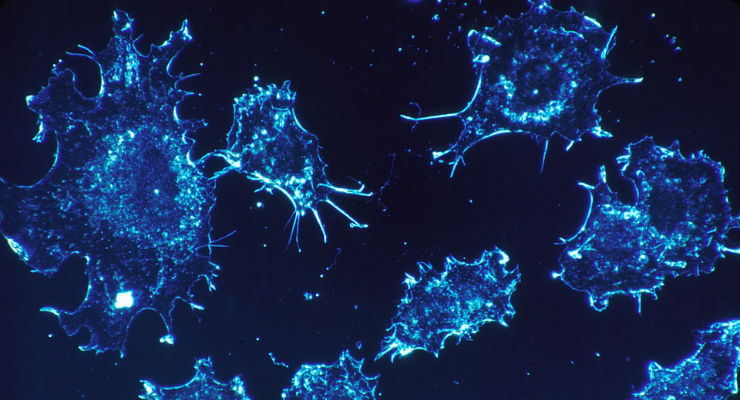Tumori: scoperta una molecola che ostacola le terapie / Tumors: discovery of a molecule that hinders therapies
Tumori: scoperta una molecola che ostacola le terapie / Tumors: discovery of a molecule that hinders therapies
Segnalato dal Dott. Giuseppe Cotellessa / Reported by Dr. Giuseppe Cotellessa

Grazie alla scoperta sarà possibile mettere a punto terapie immunologiche e trattamenti chemioterapici più efficaci, suggerisce oggi uno studio pubblicato su Nature Communication coordinato dall’immunologo Vincenzo Bronte.
Combattere i tumori significa, in alcuni casi, anche sconfiggere gli aiutanti delle cellule tumorali. E a volte l’aiutante può essere anche un ambiente favorevole alla crescita dei tumori, come quello con attività immunosoppressiva, che spegne cioè le risposte del sistema immunitario. Bloccare queste attività immunosoppressiva potrebbe aiutare a combattere il tumore. Ed è in questa direzione che va la ricerca condotta da un team dell’università di Verona coordinato dall’immunologo Vicenzo Bronte docente del dipartimento di Medicina diretto da Oliviero Olivieri. Lo studio, pubblicato su Nature Communications, apre nuove frontiere nella lotta al cancro tramite l’identificazione di una molecola che ostacola l’efficacia delle terapieper la cura dei tumori e che potrebbe diventare un bersaglio per nuovi trattamenti.
c-FLIP, la proteina con un ruolo inatteso
Lo studio ha rivelato il ruolo inaspettato di una proteina, la c-FLIP, che normalmente controlla il ciclo cellulare prevenendo la morte programmata delle cellule a seguito di danno. In situazioni patologiche, quali la progressione del tumore, si assiste ad una anormale espressione di questa proteina nelle cellule mieloidi monocitarie. In queste cellule c-FLIP promuove l’acquisizione difunzioni immunosoppressive. I monociti FLIP positivi, infatti, impediscono la proliferazione degli effettori immuni, quali i linfociti T, limitando gli effetti positivi dell’immunoterapia, l’insieme di terapie che sfruttano il sistema immunitario per combattere il tumore. Lo studio ha anche rivelato come la quantificazione dei monociti c-FLIP positivi sia un parametro importante in grado di predire l’aggressività del tumore pancreatico.
Un nuovo potenziale bersaglio contro i tumori
“Abbiamo identificato un possibile bersaglio molecolare per sviluppare nuove terapie – spiega Vincenzo Bronte – in grado di limitare l’attività delle cellule immunosoppressive che giocano un ruolo chiave nel limitare l’efficacia terapeutica nei pazienti oncologici, non solo dell’immunoterapia ma anche dei trattamenti convenzionali quali la chemioterapia. La possibilità di poter quantificare e monitorare lo stato immunosoppressivo del paziente valutando la frequenza di questa popolazione di cellule nel sangue periferico permetterà, nel prossimo futuro, di arruolare selettivamente i pazienti per una terapia personalizzata e, quindi, più efficace”.
ENGLISH
Thanks to the discovery it will be possible to develop immunological therapies and chemotherapeutic treatments more effective, suggests today a study published in Nature Communication coordinated by the immunologist Vincenzo Bronte.
Fighting the tumors means, in some cases, even defeating the helpers of the cancer cells. And sometimes the aide can also be an environment conducive to the growth of tumors, such as that with immunosuppressive activity, which extinguishes the responses of the immune system. Blocking these immunosuppressive activities could help fight the tumor. And it is in this direction that the research conducted by a team of the University of Verona coordinated by the immunologist Vicenzo Bronte, professor of the Department of Medicine directed by Oliviero Olivieri. The study, published in Nature Communications, opens new frontiers in the fight against cancer by identifying a molecule that hinders the effectiveness of cancer treatment therapies and that could become a target for new treatments.
c-FLIP, the protein with an unexpected role
The study revealed the unexpected role of a protein, c-FLIP, which normally controls the cell cycle by preventing the programmed death of cells as a result of damage. In pathological situations, such as tumor progression, there is an abnormal expression of this protein in monocitary myeloid cells. In these cells c-FLIP promotes the acquisition of immunosuppressive defunctions. The FLIP positive monocytes, in fact, prevent the proliferation of immune effectors, such as T lymphocytes, limiting the positive effects of immunotherapy, the set of therapies that exploit the immune system to fight the tumor. The study also revealed that the quantification of c-FLIP positive monocytes is an important parameter that can predict the aggressiveness of pancreatic cancer.
A new potential target against tumors
"We have identified a possible molecular target to develop new therapies - explains Vincenzo Bronte - able to limit the activity of immunosuppressive cells that play a key role in limiting the therapeutic efficacy in cancer patients, not only of immunotherapy but also of treatments conventional drugs such as chemotherapy. The possibility of being able to quantify and monitor the immunosuppressive status of the patient by evaluating the frequency of this population of cells in the peripheral blood will allow, in the near future, to selectively enroll patients for a personalized therapy and, therefore, more effective ".
Da:
https://www.galileonet.it/2018/12/tumori-molecola-ostacola-terapie/?utm_campaign=Newsatme&utm_content=Tumori%3A%2Bscoperta%2Buna%2Bmolecola%2Bche%2Bostacola%2Ble%2Bterapie&utm_medium=news%40me&utm_source=mail%2Balert



Commenti
Posta un commento